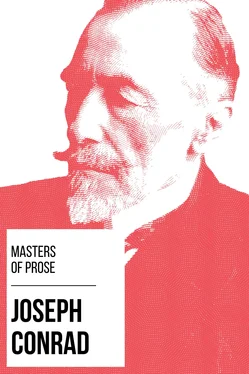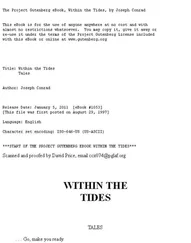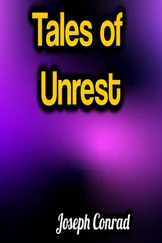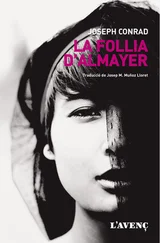For Englishmen especially, of all the races of the earth, a task, any task, undertaken in an adventurous spirit acquires the merit of romance. But the critics as a rule exhibit but little of an adventurous spirit. They take risks, of course—one can hardly live without that. The daily bread is served out to us (however sparingly) with a pinch of salt. Otherwise one would get sick of the diet one prays for, and that would be not only improper, but impious. From impiety of that or any other kind—save us! An ideal of reserved manner, adhered to from a sense of proprieties, from shyness, perhaps, or caution, or simply from weariness, induces, I suspect, some writers of criticism to conceal the adventurous side of their calling, and then the criticism becomes a mere “notice,” as it were, the relation of a journey where nothing but the distances and the geology of a new country should be set down; the glimpses of strange beasts, the dangers of flood and field, the hairbreadth escapes, and the sufferings (oh, the sufferings, too! I have no doubt of the sufferings) of the traveller being carefully kept out; no shady spot, no fruitful plant being ever mentioned either; so that the whole performance looks like a mere feat of agility on the part of a trained pen running in a desert. A cruel spectacle—a most deplorable adventure! “Life,” in the words of an immortal thinker of, I should say, bucolic origin, but whose perishable name is lost to the worship of posterity—“life is not all beer and skittles.” Neither is the writing of novels. It isn't, really. Je vous donne ma parole d'honneur that it—is—not. Not all. I am thus emphatic because some years ago, I remember, the daughter of a general. . . .
Sudden revelations of the profane world must have come now and then to hermits in their cells, to the cloistered monks of middle ages, to lonely sages, men of science, reformers; the revelations of the world's superficial judgment, shocking to the souls concentrated upon their own bitter labour in the cause of sanctity, or of knowledge, or of temperance, let us say, or of art, if only the art of cracking jokes or playing the flute. And thus this general's daughter came to me—or I should say one of the general's daughters did. There were three of these bachelor ladies, of nicely graduated ages, who held a neighbouring farm-house in a united and more or less military occupation. The eldest warred against the decay of manners in the village children, and executed frontal attacks upon the village mothers for the conquest of courtesies. It sounds futile, but it was really a war for an idea. The second skirmished and scouted all over the country; and it was that one who pushed a reconnaissance right to my very table—I mean the one who wore stand-up collars.
She was really calling upon my wife in the soft spirit of afternoon friendliness, but with her usual martial determination. She marched into my room swinging her stick . . . but no—I mustn't exaggerate. It is not my specialty. I am not a humoristic writer. In all soberness, then, all I am certain of is that she had a stick to swing.
No ditch or wall encompassed my abode. The window was open; the door, too, stood open to that best friend of my work, the warm, still sunshine of the wide fields. They lay around me infinitely helpful, but, truth to say, I had not known for weeks whether the sun shone upon the earth and whether the stars above still moved on their appointed courses. I was just then giving up some days of my allotted span to the last chapters of the novel “Nostromo,” a tale of an imaginary (but true) seaboard, which is still mentioned now and again, and indeed kindly, sometimes in connection with the word “failure” and sometimes in conjunction with the word “astonishing.” I have no opinion on this discrepancy. It's the sort of difference that can never be settled. All I know is that, for twenty months, neglecting the common joys of life that fall to the lot of the humblest on this earth, I had, like the prophet of old, “wrestled with the Lord” for my creation, for the headlands of the coast, for the darkness of the Placid Gulf, the light on the snows, the clouds in the sky, and for the breath of life that had to be blown into the shapes of men and women, of Latin and Saxon, of Jew and Gentile. These are, perhaps, strong words, but it is difficult to characterize other wise the intimacy and the strain of a creative effort in which mind and will and conscience are engaged to the full, hour after hour, day after day, away from the world, and to the exclusion of all that makes life really lovable and gentle—something for which a material parallel can only be found in the everlasting sombre stress of the westward winter passage round Cape Horn. For that, too, is the wrestling of men with the might of their Creator, in a great isolation from the world, without the amenities and consolations of life, a lonely struggle under a sense of overmatched littleness, for no reward that could be adequate, but for the mere winning of a longitude. Yet a certain longitude, once won, cannot be disputed. The sun and the stars and the shape of your earth are the witnesses of your gain; whereas a handful of pages, no matter how much you have made them your own, are at best but an obscure and questionable spoil. Here they are. “Failure”—“Astonishing”: take your choice; or perhaps both, or neither—a mere rustle and flutter of pieces of paper settling down in the night, and undistinguishable, like the snowflakes of a great drift destined to melt away in sunshine.
“How do you do?”
It was the greeting of the general's daughter. I had heard nothing—no rustle, no footsteps. I had felt only a moment before a sort of premonition of evil; I had the sense of an inauspicious presence—just that much warning and no more; and then came the sound of the voice and the jar as of a terrible fall from a great height—a fall, let us say, from the highest of the clouds floating in gentle procession over the fields in the faint westerly air of that July afternoon. I picked myself up quickly, of course; in other words, I jumped up from my chair stunned and dazed, every nerve quivering with the pain of being uprooted out of one world and flung down into another—perfectly civil.
“Oh! How do you do? Won't you sit down?”
That's what I said. This horrible but, I assure you, perfectly true reminiscence tells you more than a whole volume of confessions a la Jean Jacques Rousseau would do. Observe! I didn't howl at her, or start upsetting furniture, or throw myself on the floor and kick, or allow myself to hint in any other way at the appalling magnitude of the disaster. The whole world of Costaguana (the country, you may remember, of my seaboard tale), men, women, headlands, houses, mountains, town, campo (there was not a single brick, stone, or grain of sand of its soil I had not placed in position with my own hands); all the history, geography, politics, finance; the wealth of Charles Gould's silver-mine, and the splendour of the magnificent Capataz de Cargadores, whose name, cried out in the night (Dr. Monygham heard it pass over his head—in Linda Viola's voice), dominated even after death the dark gulf containing his conquests of treasure and love—all that had come down crashing about my ears.
I felt I could never pick up the pieces—and in that very moment I was saying, “Won't you sit down?”
The sea is strong medicine. Behold what the quarter-deck training even in a merchant ship will do! This episode should give you a new view of the English and Scots seamen (a much-caricatured folk) who had the last say in the formation of my character. One is nothing if not modest, but in this disaster I think I have done some honour to their simple teaching. “Won't you sit down?” Very fair; very fair, indeed. She sat down. Her amused glance strayed all over the room.
Читать дальше












